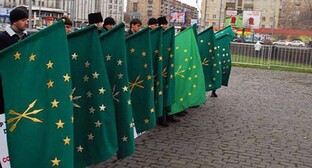
21 August 2020, 13:38
Natives of Chechnya tell about activeness of "Moral Guards" in Europe
The members of the "Moral Guards" group detained in Austria have a vague idea of Chechen traditions, the observance of which they demand from Chechen women, members of the Diaspora believe. According to their version, similar groupings of "Moral Guard" are also active in France, Belgium and Germany.
The "Caucasian Knot" has reported that on August 14, it became known that Austrian law enforcers detained five men and a woman, aged 19-37, suspected of creating a criminal community and "inflicting multiple bodily wounds."
According to the police, the "Moral Guards" grouping emerged in early 2020; its members account for at least 10 cases of intimidation and beatings of members of the Chechen Diaspora in Vienna and Linz. Their victims were mostly women who were accused of "immoral" or "too Western" behaviour.
The police began dealing with the "Moral Guards" case back in March, after the mother of one of the girls, who became the object of attention of the grouping, turned to the police, Amina, a former journalist, now a member of the Chechen Diaspora in Austria, told the "Caucasian Knot" correspondent.
According to Amina, the "Moral Guards" called their group in the social network in German – Sittenwächter ("Morals Guardians"). "Everything there was in the German language. The guardians of Chechen traditions don't really know the Chechen language. They communicate mainly in German. Even this fact shows the absurdity of what is happening," she said.
In her opinion, these young people were born in Europe or were taken out of Chechnya as children and know little about their homeland, borrowing their knowledge from the Internet.
"They didn't post photos and videos of these girls right away. At first they invited them for contact, a conversation and tried to persuade them, and threatened: 'If you don’t behave properly, we'll disgrace you.' They have no idea that, actually, according to Chechen traditions, they have no right to address other girls, shadow them and, especially, post their data in an Internet public. [...] If we are talking about traditions, then this is an intra-family matter," Amina is sure.
Khusein Iskhanov, the head of the "Cultural Association of Ichkeria" in Austria, has confirmed that the behaviour of the girls that has attracted the attention of the "Moral Guards" is an intra-family matter of the natives of Chechnya. "Hiding behind Chechen traditions in this case is absurd, since such things as how to dress and how to behave are discussed only in the family," he told the "Caucasian Knot" correspondent.
Leila, a lawyer, who lives in Paris, is glad that a case against the "Moral Guards" has been opened in Austria, because, according to her story, persecutions of Chechen girls in European countries have become systematic. In her opinion, similar groupings of "moral guards" are active in France, Belgium and other countries.
This article was originally published on the Russian page of 24/7 Internet agency ‘Caucasian Knot’ on August 21, 2020 at 10:00 am MSK. To access the full text of the article, click here.
Author: Anastasia Kirilenko Source: CK correspondent




